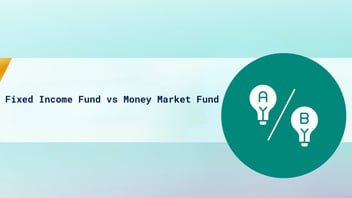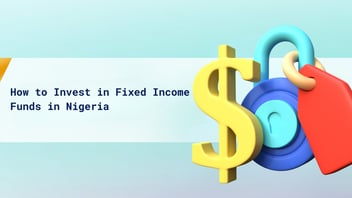
What is Fixed Income and Debt Market
Author Taiwo Temitope-Adesope
The fixed-income and debt markets play a crucial role in the Nigerian economy, facilitating the flow of capital between borrowers and investors. These markets enable the government, corporations, and other entities to raise funds by issuing debt securities, such as bonds and treasury bills. At the same time, investors, including individuals, pension funds, and institutional investors, can earn regular income and diversify their portfolios by investing in these securities.
The fixed-income and debt markets are essential for Nigeria's economic development, as they finance infrastructure projects, corporate growth, and job creation. By understanding these markets' dynamics, investors can make informed decisions and potentially benefit from regular income streams and capital preservation.
Key Components of the Nigerian Fixed Income and Debt Market
Types of Securities:
- Federal Government Bonds (FGN Bonds): These are debt securities issued by the Nigerian government to finance its operations and development projects. They have various maturities, ranging from 3 to 30 years, and offer semi-annual interest payments.
- State Government Bonds: Similar to FGN bonds but issued by individual state governments to fund their respective projects and initiatives.
- Corporate Bonds: Debt instruments issued by private companies to raise capital for business expansion, operations, and other purposes.
- Treasury Bills: Short-term (up to one year) debt securities issued by the Nigerian government to meet its short-term financing needs.
- Commercial Papers: Unsecured, short-term debt instruments issued by corporations to finance their working capital requirements.
- Promissory Notes: Negotiable instruments that represent a promise to pay a specified amount on a given date, often used for short-term financing.
- Supranational Bonds: Debt securities issued by international organizations like the World Bank or African Development Bank, denominated in local or foreign currencies.
- Market Participants:
- Issuers: The federal government, state governments, and corporations that issue debt securities to raise funds.
- Investors: Individuals, pension funds, institutional investors (e.g., banks, insurance companies), and
foreign investors who purchase these securities.
- Market Makers: Financial institutions that facilitate liquidity by quoting buy and sell prices for securities.
- Regulators: The Securities and Exchange Commission (SEC), Central Bank of Nigeria (CBN), and Debt Management Office (DMO) oversee and regulate the fixed-income and debt markets.
How the Fixed Income and Debt Market Works
Primary Market:
The primary market is where new debt securities are issued and sold to investors for the first time. This process typically involves auctions or direct sales, where the issuer (government or corporation) offers the securities to the public or institutional investors.
Secondary Market:
After the initial issuance, existing debt securities can be traded between investors on the secondary market. In Nigeria, the Nigerian Exchange Limited (NGX) serves as the primary platform for trading fixed-income securities. Market makers play a crucial role in providing liquidity by quoting buy and sell prices and facilitating trades.
Benefits of Investing in the Fixed Income Market
- Regular Income: Fixed-income securities offer predictable interest payments, providing investors with a stable income stream.
- Capital Preservation: Certain securities, especially government-backed bonds, are considered low-risk investments, with a high probability of returning the principal at maturity.
- Diversification: Fixed-income investments can balance out riskier assets, such as stocks, in an investment portfolio, reducing overall portfolio risk.
- Potential for Capital Gains: If interest rates decline, the value of existing fixed-income securities can increase, presenting an opportunity for capital gains when sold at a higher price.
Risks Associated with Fixed Income Investing
- Interest Rate Risk: The value of fixed-income securities can decrease when interest rates rise, as newly issued bonds with higher coupon rates become more attractive to investors.
- Credit Risk: There is a risk that the issuer may default on interest or principal payments, especially for corporate bonds and lower-rated securities.
- Inflation Risk: If inflation rates exceed the returns on fixed-income investments, the real value of the investment can be eroded.
- Liquidity Risk: Some fixed-income securities, particularly those with longer maturities or issued by smaller entities, may be less liquid, making it difficult to sell them quickly without significant price impact.
The Role of Fixed Income and Debt Markets in Economic Development
- Financing Government Projects: The fixed-income market allows the Nigerian government to raise funds through bond issuances to finance critical infrastructure projects, such as road construction, power generation, and healthcare facilities.
- Corporate Growth: By issuing bonds and other debt securities, Nigerian companies can access capital for business expansion, research and development, and operational needs, driving economic growth and job creation.
- Creating Jobs: The economic activities facilitated by the fixed-income and debt markets contribute to job creation in various sectors, including construction, manufacturing, and services.
Conclusion
The fixed-income and debt market in Nigeria plays a vital role in supporting the country's economic development by facilitating the flow of capital between borrowers and investors. These markets offer a range of investment opportunities, from government bonds to corporate debt securities, catering to different risk appetites and investment objectives.
While investing in fixed-income securities can provide regular income and capital preservation, it is essential for investors to carefully consider the associated risks, such as interest rate risk, credit risk, and inflation risk. By diversifying their portfolios and staying informed about market trends and developments, investors can potentially benefit from the opportunities presented by the Nigerian fixed-income and debt market.
Looking ahead, the Nigerian fixed income and debt market is expected to continue evolving, with potential innovations in financial technology and increased participation from foreign investors. Regulatory bodies like the SEC, CBN, and DMO will play a crucial role in ensuring the market's transparency, efficiency, and overall stability.
For more information and insights into the Nigerian fixed-income and debt market explore the following helpful resources:
- Debt Management Office Nigeria - The official website of the Debt Management Office, provides information on government debt securities.
- Central Bank of Nigeria - Responsible for monetary policy and regulation of the financial system.
Visit nairaCompare to make informed financial decisions tailored to your needs.
About Author

Taiwo Temitope-Adesope
Taiwo is a passionate storyteller and strategist dedicated to empowering women and crafting compelling narratives. A First-Class graduate in Mass Communication from Covenant University, she specializes in writing, public relations, and digital marketing. As a Content Manager at Suretree, she drove a 50% increase in web traffic through SEO and boosted website engagement by 60% in just four months. Her leadership experience includes serving as Public Relations Officer for the Covenant University Student Council and contributing to impactful volunteer initiatives. With expertise in strategic thinking and business acumen, Taiwo continues to create stories that inspire confidence and imagination.
.png?width=1615&height=444&name=nairaCompare%20Christmas%20logo%20(PNG).png)








